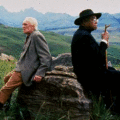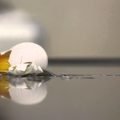
And here is Henry, Thomas’s younger brother, already recognized as one of the most ambitious Labour MPs of his generation. Their relationship goes beyond the ordinary ties of blood and extends to a number of common business interests, for Henry has a seat on the board of several companies generously supported by Thomas’s bank. Should anyone have the temerity to suggest a conflict of loyalty between these activities and the socialist ideals which he professes so loudly in the House of Commons, Henry has a variety of well-rehearsed answers. He is used to dealing with naïve questions, which is why he is able to laugh airily as his young cousin Mark shoots him a teasing glance and says:
‘So, I take it you’ll be travelling back to London first thing tomorrow morning, in time for the demonstration? We all know that you Labour bods are in cahoots with CND.’
‘Some of my colleagues will undoubtedly be attending. You won’t find me there. There are no votes in the nuclear issue, for one thing. Most of the people in this country recognize the unilateralists for what they are: a bunch of cranks.’ He pauses to allow one of the under-footmen to refill their glasses of champagne. ‘Do you know the best bit of news I’ve heard all month?’
‘Bertrand Russell getting seven days in the slammer?’
‘That did bring a smile to my face, I must say. But I was thinking more about Khrushchev. I suppose you’ve heard that he’s started testing H-bombs again, out in the Arctic or somewhere?’
‘Really?’
‘Ask Thomas what that did to shares in the munitions companies a couple of days later. Through the roof, they went. Through the bloody roof. We made a few hundred grand overnight. I’m telling you, earlier this year, with Gagarin coming over and everyone talking about a bit of a thaw, things were beginning to look a bit shaky. I didn’t like the look of it at all. Thank God it turned out to be a flash in the pan. First the Wall goes up, and now the Russkies start letting off fireworks again. Looks like we’re back in business.’ He drains his glass and pats his cousin affectionately. ‘Of course, I can talk to you like this, because you’re family.’
∗
Mark Winshaw digests this information in silence. Perhaps because he never knew his own father, Godfrey, he has always regarded his cousins as paternal figures and looked to them for guidance. (His mother has attempted to offer him guidance too, of course, has tried to inculcate her own values and codes of conduct, but he has, from an early age, made a point of ignoring her.) He has already learned a great deal from Thomas and Henry, about how to make money, and how the divisions and conflicts between lesser, weaker-minded men can be exploited for personal gain. He will be going up to Oxford in a few weeks’ time, and has just spent the summer working in a minor administrative capacity at the office of Thomas’s bank in Cheapside.
‘It was so kind of you to give him that job,’ Mildred now says to Thomas. ‘I do hope he wasn’t a nuisance or anything.’
Mark’s expression is one of undiluted hatred, but his glance goes unnoticed, and he says nothing.
‘Not at all,’ Thomas answers. ‘He was very useful to have around. In fact he made quite an impression on my colleagues. Quite an impression.’
‘Really? In what way?’
Thomas proceeds to tell the story of a discussion which took place between senior members of the bank over lunch in the City one Friday afternoon: a lunch to which Mark had been invited. The conversation had turned to the recent resignation of one of the partners over the role taken by the bank in the Kuwait crisis. Thomas feels called upon to explain the details of this crisis to Mildred, assuming that, as a woman, she won’t know anything about it. He therefore tells her how Kuwait was declared an independent Sheikdom in June, and how, only one week later, Brigadier-General Kassem had announced his intention of absorbing it into his own country, claiming that according to historical precedent it had always been an ‘integral part of Iraq’. He reminds her that Kuwait had appealed to the British government for military support, which had been promised by both the Foreign Secretary, Lord Home, and the Lord Privy Seal, Edward Heath; and that, since the first week of July, more than six thousand British troops had been moved to Kuwait from Kenya, Aden, Cyprus, the United Kingdom and Germany, establishing a sixty-mile defence line only five miles from the border in readiness for an Iraqi attack.
‘The thing is,’ says Thomas, ‘that this junior partner fellow, Pemberton-Oakes, couldn’t stomach the fact that we were still lending enormous sums of money to the Iraqis to help them keep their army going. He said that they were the enemy, and we were more or less at war with them, so we shouldn’t be giving them any help at all. He said it was Kuwait we should be dealing with as a matter of principle – I think that was the word he used – even though their borrowing requirements were pretty negligible and the bank wouldn’t get much out of it in the long run. Well, there we all were, with people chipping in on both sides, putting the alternative points of view, when somebody had the bright idea of asking young Mark what he thought.’
‘And what did he think?’ asks Mildred, with a resigned note to her voice.
Thomas chuckles. ‘He said it was perfectly obvious, as far as he could see. He said we should be lending money to both sides, of course, and if war broke out we should lend them even more, so they could be kept at it for as long as possible, using up more and more equipment and losing more and more men and getting more and more heavily in our debt. You should have seen their faces! Well, it was probably what they’d all been thinking, you see, but he was the only one who had the nerve to come right out with it.’ He turns to Mark, whose face has remained, throughout this conversation, a perfect blank. ‘You’ll go a long way in the banking business, Mark, old boy. A long way.’
Mark smiles. ‘Oh, I don’t think banking is for me, to be honest. I intend to be more in the thick of things. But thanks for giving me the opportunity, all the same. I certainly learned a thing or two.’
He turns and crosses the room, conscious that his mother’s eyes have never left him.







